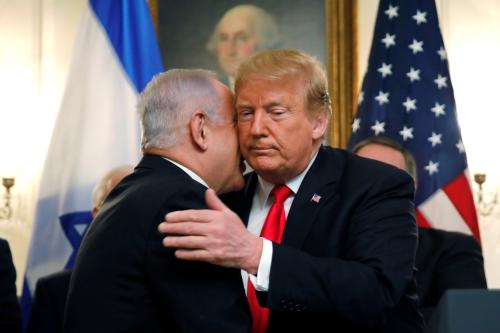President Trump’s son-in-law and top Middle East adviser, Jared Kushner, pushed back recently against suggestions that the administration should hold off on its expected “deal of the century” plan for Middle East peace over concerns that it’s likely to be dead on arrival. As part of the unveiling, the administration revealed plans to hold an “economic workshop” in Bahrain to discuss “potential economic investments and initiatives that could be made possible by a peace agreement.” Immediately rejecting the idea, the Palestinians called it an attempt “at promoting an economic normalization of the Israeli occupation of Palestine.”
While the specific details of the Trump plan remain unknown, we already know the troubling principles on which the plan is based.
Details aside, Trump’s approach not only breaks with international law and long-held U.S. policies, it also enshrines historic U.S. responsibility in an unjust process that will ultimately backfire against Israel, the Palestinians, and American interests.
Let’s start with the principles of the approach as revealed by Kushner and other members of Trump’s team. While ignoring prior peace agreements, U.N. resolutions, and international law, Trump’s approach is anchored on three flawed principles: “realities” on the ground as they are, appeal to ethnic/religious justifications of Israeli control of occupied territories, and economic incentives to appease Palestinian political aspirations. The first ignores the history of the U.S. role in creating these realities; the second ignores the future consequences of framing the Palestinian-Israeli conflict as an ethnic/religious conflict, instead of a nationalist conflict; the third misses not only the nature of the Palestinian struggle, but of the human condition.
Without the weight of international law and United Nations resolutions, the “realities” on the ground are hugely advantageous to Israel: Palestinians remain stateless and under occupation. To varying degrees, Israel controls all Palestinian territories, with expanding Israeli settlements in the occupied West Bank. While the Palestinians have limited security forces and armed militias, Israel commands the strongest army in the region and its GDP is 23 times the size of that of the Palestinians in the West Bank and Gaza.
Some of these realities are in large part due to historic U.S. support for Israel. To be sure, multiple U.S. administrations have engaged in good-faith efforts to address the Palestinian-Israeli conflict, sometimes promisingly. And the blame for failure must be spread, including to Israelis, Palestinians, and other Arabs. But the core American empowerment of Israel has remained largely consistent throughout.
Much is made of the $3.8 billion in annual U.S. aid to Israel—more than all of the combined American security aid to the rest of the world. But the biggest assistance to Israel is not financial. Three U.S. strategic assets have particularly shielded Israel from feeling meaningful regional or international heat over its occupation of Palestinian territories and constructing illegal settlements there.
One big asset favoring Israel is the American mediation of the Camp David Accords between Israel and Egypt 40 years ago and expending much leverage to maintain them since. These accords have arguably served Israeli, Egyptian, and American interests. They have also substantially reduced the chance of Egyptian-Israeli war (a good thing). But they also reduced the leverage in favor of Israeli compromise toward the Palestinians—the opposite of what President Jimmy Carter had hoped for, and an aspect over which he now expresses some “lingering disappointment.”
Second, the United States has shielded Israel at the United Nations. Since the establishment of Israel in 1948, a majority of vetoes employed by the U.S. at the U.N. Security Council pertained to Israel—43. It is reasonable to assume that, had it not been for the U.S. threat of veto, illegal Israeli settlements would have been sanctioned by the international community.
Third, the Israeli military’s upper hand is in part due to its success in building an effective organization; in only a few decades, Israelis have built a successful and prosperous advanced state. But there should be no illusion. The upper hand that Israel has over combined regional armies, and maybe even Russian forces in Syria, is principally a function of one thing: U.S. commitment to provide Israel with the cutting edge technology to assure its qualitative military edge over anyone else.
Aid has made Israel more secure, as intended. It has often served mutual Israeli and American interests. But one argument for the unparalleled level of support has been that a secure Israel will be better able to compromise. Instead, aid has created more asymmetry with reduced Israeli incentive to adhere to international law and to compromise.
All this to say that the historic American commitment to Israel, manifesting itself in unparalleled backing, means the U.S. has a responsibility to mitigate the resulting asymmetric realities through fair efforts. Instead, Trump promises not only to enshrine the deep inequality but also to deploy the assets of a superpower to sway the weaker party, including by withholding humanitarian aid as an instrument of political pressure
Beyond “realities” that ignore the past, Trump’s approach embraces a dangerous framing of the conflict as a religious/ethnic conflict with no end in sight. Trump advisers’ justification of Israeli settlements in the West Bank and Israeli sovereignty over a unified Jerusalem with reference to faith and biblical claims is both wrong and dangerous. It is wrong because—even as everyone is entitled to their own faith and religious narrative—such narratives cannot be the basis of political sovereignty in our time. And it’s dangerous because it pits “Jewish” and “Christian” narratives against Muslim/Arab narratives, assuring decades of conflict with little hope for compromise.
Sure, Arab governments will always do what’s good for them and their own states, and their priorities may incline them to swallow hard and acquiesce. But consider this: Despite 40 years of effective state-to-state peace between Israel and Egypt—and 24 years of peace between Israel and Jordan—the Jordanians and Egyptians reject “normalization” with Israel and largely consider Israel as their enemy. Sure, Egyptians and Jordanians (like others in Arab countries) may identify with their own states first. But they will never stop being also Arab and (mostly) Muslim—identities that are emphasized especially as Israel has increasingly defined its character in religious/ethnic terms.
Peace with Palestinians that addresses their political aspirations and yearnings for freedom is Israel’s path to acceptance by Arab and Muslim masses; without an Israeli-Palestinian peace, it’s a Jewish-Muslim or an Arab-Israeli conflict for decades to come.
As Kushner counsels dropping talk of two states—and certainly would reject full equality of Palestinians and Israelis as an alternative—all the economic incentives that Trump may offer Palestinians could never satisfy their yearnings. In the hopeful days of the 1990s, a great deal was invested in such ambitious projects as Bethlehem 2000. When political negotiations collapsed, violence erupted, and investments went up in flames. To assume that the promise of economic improvement would outweigh ordinary human aspirations of a people who have painfully struggled for decades is to miss the nature of the human condition.
Israeli, Palestinian, and Arab leaders share the blame for the absence of peace. But the American role is inescapable. Details aside, the principles of Trump’s approach implicate the U.S. in a hopeless path that plants the seeds of more trouble ahead. There will be no winners here, only losers, some more than others.
The Brookings Institution is committed to quality, independence, and impact.
We are supported by a diverse array of funders. In line with our values and policies, each Brookings publication represents the sole views of its author(s).









Commentary
How Trump’s approach to the Middle East ignores the past, the future, and the human condition
May 20, 2019